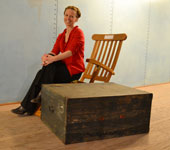Herman Blom had secured a job as a welder in Saskatoon and the family was on their way, but their brief quarantine left him jobless.
His daughter, Gysje Koenderink, recalled an exciting crossing in which she and her five brothers and sisters saw icebergs and whales and were treated to daily performances by their opera singing table steward. The Bloms expected to pass through Pier 21 quickly and be on their way but, as Gysje explains, something was wrong with her brother Wally.
“We were the last passengers to leave the ship as Wally had come down with the German measles and we were put into quarantine,” Gysje wrote.
“Wally was put in the sickbay of Pier 21, Dad and the three boys in the men's dormitory and Mom and the two girls in the women's dormitory.
“Our suitcases, passports and landing papers were confiscated. The doors to the dormitories were closed at 10pm. Locking the doors wasn't necessary as there were no handles on the inside and the windows were barred. At night we washed our underwear in the bathroom sink for the next day because we didn't get access to our suitcases.
This was an unbelievably frightening time for her parents but Gysje and her healthy siblings did what all of us are trying to do, they found humour in little everyday things, well maybe not everyday things unless you play a lot of Hot Potato.
“Meals were served cafeteria style and we'll never forget Gerry's face, when the lady who was serving, kept stabbing a potato to put it on his plate and it kept breaking up. She finally looked at the potato and at the fork, put the fork down and reached in and with her bare hand picked one up and put it on his plate. Gerry's eyes almost fell out of his head,” Gysje recalled.
Not long after that came a reprieve not unlike our being granted permission for short walks outside.
“After the first 48 hours my Dad was given a paper that allowed us play at being a tourist in Halifax. But before that we stood on the balcony of Pier 21 and in tears watched the Groote Beer leave again for Holland. For two cents we would have gone with her. On the fourth day our things were given back to us and we were put on a train for Saskatoon.”
Due to the delay caused by the quarantine Gysje’s father lost his job so their first days in Saskatoon were tough.
In time they bought a farm in Ontario. Life continued to challenge the Bloms, and it still did at the time of her memoir submission, but their many trials made them a very close family.
Gysje’s closed with a sentiment about sharing our blessings and taking care of each other. We hear you Gysje and we will look for you.
“After Dad passed away Mom's own health went downhill. She had open heart surgery but never really recovered and ended up with her kidneys failing.
“All their children have done well and all are married. They had 14 grandchildren and 9 great grandchildren. Dad died at the age of 81 in May of 1995 of heart disease and Mom died at age 80 in October of 1998 of kidney failure.
“Wally is looking forward to a kidney transplant as his kidneys have failed and he is now on dialysis. Gerry is going to give him one of his kidneys.
“We have a great family when the chips are down, it is all for one and one for all. We hope the surgery is soon as all is a go with my brothers and we only have to wait for the doctors and the hospital to be ready. This is just a little aside in the hope that all you people out there will sign your donor cards.
“Canada has done much for you. Maybe you can give some Canadian something back without which they will die. All of us are happy and proud to call ourselves Canadian. And we will have a plaque on the wall of Pier 21 so please look for us.”
Canadian Museum of Immigration at Pier 21 (S2012.183.1)
